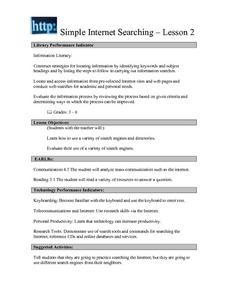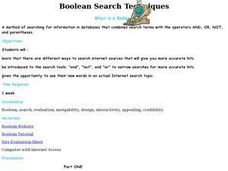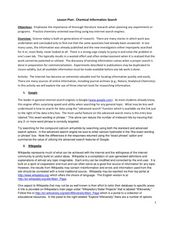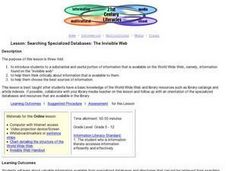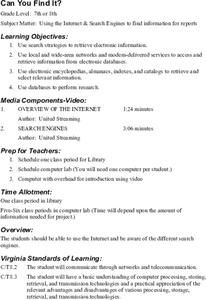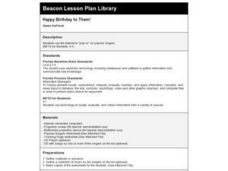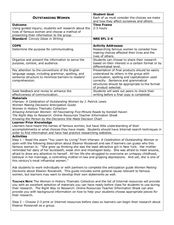Curated OER
Simple Internet Searching Lesson 2
Learn how to use search engines and keywords! Learners evaluate the information process using given criteria and determine ways in which the process may be improved.
Curated OER
Finding Your Way in the World Wide Web
Researchers practice grouping items to explore the concept of a database. They apply these concepts to the WWW search engine format and consider why it is important to enter the most specific information.
Education World
Use Boolean Search Terms to Shorten Web Searches
Have you ever conducted a Web search and received too many hits? Teach your class about Boolean search terms and provide them time to practice conducting efficient online searches. This lesson plan contains several fun activities which...
Curated OER
Ecuadorian Rainforest
Have your class talk about the importance of the rainforest and the products that come from it. Learners watch a video showing the path of chocolate from the rainforest to the supermarket. They discuss how the rainforest and...
Curated OER
Smart Keyword Searching
Students explore various methods for completing effective keyword searches on the Internet. Through guided practice students complete various keyword searches. They independently complete a worksheet designed to aid in their keyword...
Curated OER
Hamlet Research Paper: Find, Evaluate, and Select Appropriate Research Sources
Help young researchers find credible sources online. Modeling with a Google search for information about Shakespeare’s Macbeth, use a computer projector or Smart Board to show class members how weak the top three search results are....
Curated OER
General Web Search Tools: An Introduction
Students study the three major web search tools: search engines, directories, and metasearch engines. They examine the appropriate times to use each of the search tools.
Curated OER
How Can We Do Research on the Internet?
Students demonstrate how to use the Internet to research historical individuals. In this technology lesson plan, students use the "Internet Coach" CD-ROM to identify how to gather information on the Internet. Students choose an...
Curated OER
Creating an Effective Search Statement
Students identify how to turn a topic statement or research question into an effective search statement for use with electronic databases or web search engines. They apply use of Boolean operators in the searches.
Curated OER
Boolean Search Techniques
Students search using the Boolean search model. In this navigating the Internet lesson plan, students narrow their searches using and, or ,not and parentheses. Students recognize the differences in a one word search and one...
Curated OER
Get Ready For Some Football
Sixth graders compare and contrast the totals from two national football teams for the year. Using the internet, they search for the information they need and create a data bar graph. They use the information they collected to answer...
Curated OER
Chemical Information Search
High schoolers research information using various internet resources. In this chemistry lesson, students demonstrate their ability to navigate websites and gather necessary information. They evaluate the potential usefulness of the...
Curated OER
Simple Internet Searching - Lesson 1
Students formulate strategies for locating information by identifying keywords and subject headings and by listing the steps to follow in carrying out information searches. They locate and access information from pre-selected sites.
Curated OER
Research on the Internet
Students are able to identify strategies for doing research on the Internet. They are able to use starting point documents for Internet research. Students are able to search the Internet by content using subject trees and search engines....
Curated OER
CAREER RESEARCH FOR HIGH SCHOOL STUDENTS
Learners use a search engine to build a list of skills needed for their career path of interest.
Curated OER
How Animals Meet Their Needs
Fourth graders research the Internet for facts relating to the animal of their choice. They use information from their Internet search to complete their animal project. TLW use his or her own words when writing their report.
Curated OER
Finding Content/Media
Sixth graders use the web to find and download photos, images, and clip art to create a large library of images in a short time. They survey audio and video files and other media by using various search engines. Remember to follow...
Curated OER
Searching Specialized Databases: The Invisible Web
Students examine the useful information to be found on the "invisible web." They find the best sources of relevant information.
Curated OER
Can You Find It?
Students use the Internet and search engines to research a foreign country. They use the Internet and library to further their understanding on how to use those resources.
Curated OER
Happy Birthday to Them!
Third graders use a search engine to search the Internet and find the birthdates of the singers listed on the Popular Singers Worksheet. They provide the URL address from which they obtain their information for each singer.
Curated OER
Exploring the Internet Properly
Pupils explore subscription databases, directories, and search engines to find information about a native Michigan animal. They research using the Internet and develop an understanding and appreciation for the resources available.
Curated OER
Fourth Grade Language: Research Process
In this review of fourth grade resource usage worksheet students answer questions about guide words, library database, resources for specific information, parts of a book, and dictionary usage. Students answer 10 questions.
Curated OER
Outstanding Women
Research the lives of famous women in this social studies lesson. Middle schoolers use various sources to research a famous woman and create a presentation about the accomplishments of the woman. They can find the central idea throughout...
Curated OER
Who Stole My Salad?
Eighth graders explain how protein is made in the cell. For this biology lesson, 8th graders translate RNA and DNA using an internet database. They determine the thief based on evidence collected.


